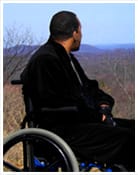Statutory Protection Of Nursing Home Residents
The abuse of nursing home residents has come to the attention of the public in the past few decades. The frequency of abuse was shocking not only to the public, but to lawmakers as well. Some of the abuse brought to light included: physical abuse, deprivation of food, water or medical care and residents being taken advantage of financially. When the widespread nature of this abuse and neglect became known, state and federal legislatures enacted laws to protect elderly persons and other nursing home residents.
There are now federal and state laws to protect residents against abuse, neglect and exploitation. The states may apply these protections differently, but the basic protections are the same. For example, most states have a system of adult protective services for investigating and remedying reported abuse. Generally, abuse or neglect is considered a criminal offense and there is often a civil cause of action for abuse, neglect or exploitation of nursing home residents. Some states also have consumer protection statutes that may provide a statutory duty of care for residents of a nursing or care facility. If you are a nursing home resident who has been mistreated, or if you care about such an individual, do not hesitate to contact an experienced elder law attorney at Ellis Law, P.C. in Poughkeepsie, NY, to pursue appropriate legal redress.
Federal Protection Of Nursing Home Residents
Most states have enacted protection statutes as the result of federal statutes protecting residents of nursing and care facilities. Among federal protection statutes are Title XX of the Social Security Act, the Long-Term Care Ombudsman Program, the Older Americans Act and the Nursing Home Reform Act.
Title XX of the Social Security Act compels states to fund protective services for adults. Adult protective Services (APS) were created to protect nursing home residents from abuse, neglect and exploitation by facility staff members or other individuals. By creating APS, states are in compliance with Title XX and able to receive federal funding for state run care facilities. Title XX also lead to Congress directing all states to establish a Long-Term Care Ombudsman program in 1978. The Long-Term Care program provides individuals in nursing or care facilities with protection against neglect and abuse. Likewise, The Older Americans Act creates federal programs designed to identify, prevent and address elder or nursing home resident abuse. The Nursing Home Reform Act sets standards for Medicare and Medicaid funded long-term care facilities. The standards set forth in federal law were enacted by the states, although some states differ in application. Even with differing interpretation of federal law, state statutes have the same basic protections against abuse, neglect or exploitation against nursing home residents.
State Protective Statutes
States have enacted protection statutes as a result of federal statutes protecting care facility residents from mistreatment. Mistreatment may be in the forms of abuse, neglect or exploitation. Abuse is typically thought of as physical, but also includes emotional abuse. Abuse or neglect may also be shown by unreasonable confinement of a resident, including unnecessary use of restraints and deprivation of necessities. Exploitation may also be physical or financial in nature. Examples of physical exploitation are sexual exploitation, threats, intimidation and the inability to give informed consent due to threats and/or intimidation. Financial exploitation includes money or property that is taken from an individual without his or her consent.
Speak To A Personal Injury Lawyer
If you or a loved one in a nursing home has been neglected, abused or financially exploited, it is likely that there is a state statute designed specifically to remedy the situation. Do not hesitate to contact an attorney at Ellis Law, P.C. in Poughkeepsie, NY to discuss initiating an investigation with your state’s adult protective services and, possibly, a civil lawsuit.

